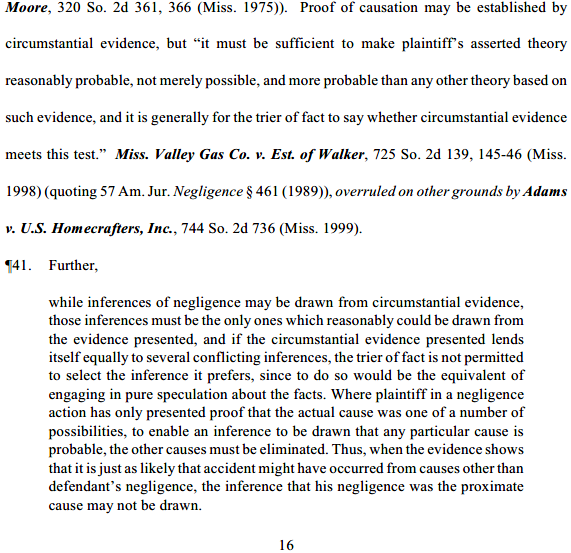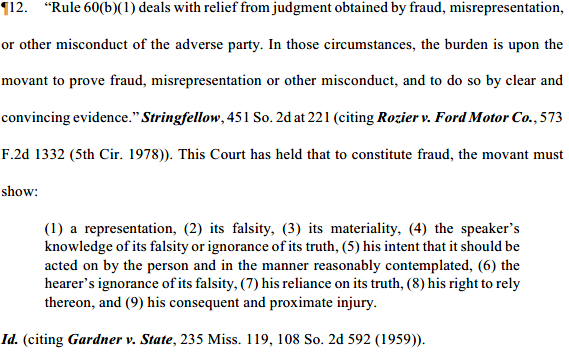The Court of Appeals handed down nine opinions today and there is something for just about every practice area. There are two appellate jurisdiction cases, a will contest, a breach of contract case, two direct criminal appeals, a divorce/marital estate division case, a breach of termite contract case, an intra-church lawsuit, and an intentional tort/attorney’s fees case.
Herning v. Lakeview S/C Partners, Ltd., 2021-CA-01427-COA (Civil – Other)
Affirming the circuit court’s dismissal of the defendant’s appeal from summary judgment for the plaintiff entered by the county court, holding that the defendant failed to pay the cost bond for his appeal within the thirty-day time limit so the circuit court lacked jurisdiction.
(8-2: McDonald concurred in part and dissented in part without separate written opinion; Lawrence dissented without separate written opinion.)
Pearson v. Eubanks, 2022-CA-00011-COA (Civil – Wills, Trusts & Estates)
Reversing the chancery court’s dismissal of a will contest, holding that the plaintiffs’ well-pleaded allegations when the filed the will contest provided them stating to contest the will on undue influence grounds.
(10-0)
Lewis v. State, 2021-KA-00472-COA (Criminal – Felony)
Affirming conviction of first and second degree murder, holding:
1. No error in transferring venue that the defendant requested.
2. No error in denying Castle Doctrine and stand-your-ground jury instructions.
3. The doctrine of retroactive misjoinder did not apply.
4. Limiting the defense’s cross-examination of a witness about his pending indictment was harmless error.
5. The objection to the investigator’s testimony about exit wounds was waived.
6. No speedy trial violation (issue raised pro se)
7. No error in denying the motion to quash and dismiss the indictment (issue raised pro se)
8. The State did not commit prosecutorial misconduct (issue raised pro se)
9. No error in allowing the jury to review transcript of the defendant’s recorded statement (issue raised pro se)
10. Evidence was sufficient and the verdict was not against the overwhelming weight of it (issue raised pro se)
(7-3-0: Barnes and Lawrence concurred in part and in the result without separate written opinion; Smith concurred in part and in the result, joined by Barnes and Lawrence.)
Kloss v. Bay Pest Control, Inc., 2021-CA-01117-COA (Civil – Contract)
Affirming summary judgment dismissing breach of termite-prevention contract and negligence claim, holding that the presence of termites alone did not support the breach of contract claim or the negligence claim.
(8-2-0: Westbrooks and McDonald concurred in result only without separate written opinion.)
Underwood v. State, 2021-CP-01123-COA (Civil – Other)
Dismissing direct appeal of a guilty plea for lack of jurisdiction without prejudice.
(10-0)
Christian v. State, 2021-KA-00898-COA (Criminal – Felony)
Affirming conviction of aggravated assault upon receipt of a Lindsey brief and the Court’s review of the record, holding that there were no arguable issues for appeal.
(10-0)
Lewis v. Lewis, 2022-CA-00016-COA (Civil – Domestic Relations)
Affirming the chancery court’s line of demarcation for division of the marital estate and award of alimony, holding that the chancellor was well within her discretion to use a December 2020 temporary order as the line of demarcation rather that the trial date and that the chancellor’s alimony findings were sufficient and her ruling was not ab abuse of discretion.
(10-0)
Miller v. Board of Trustees of Second Baptist Church of Starkville, 2020-CA-01384-COA (Civil – Other)
Reversing a monetary judgment following a jury trial, holding that the board of trustees of a church lacked standing to sue the church’s senior pastor and chairman of its deacons for breach of fiduciary duties and other claims, holding that the board lacked authority to file the lawsuit without the church members’ approval and lacked authority to maintain suit after a majority of members voted against it.
(5-2-3: Westbrooks and Emfinger concurred in part and in the result without separate written opinion; Greenlee dissented without separate written opinion; Barnes dissented, joined by Greenlee and McDonald)
Herbert v. Herbert, 2021-CA-01291-COA (Civil – Domestic Relations)
Affirming on direct appeal and reversing on cross-appeal, holding that the circuit court erred in granting summary judgment on the grounds the affirmative defense of release because that defense had been waived but affirming on de novo review of the merits of claims for intentional infliction of emotional distress, verbal assault, conversion, fraudulent misrepresentation, defamation, and breach of contract, but reversing the circuit court’s denial of attorney’s fees to the defendant and remanded for further proceedings.
(6-1-2: McDonald concurred in result only without separate written opinion; Carlton concurred in part and dissented in part, joined by McDonald; Emfinger did not participate.)
Other Orders
Lofton v. Lofton, 2021-CA-00035-COA (denying rehearing)
Yarborough v. Singing River Health Systems, 2021-CA-00668-COA (denying rehearing)
Buchanan v. State, 2021-CP-01069-COA (recalling mandate so motion for rehearing can proceed on merits)



